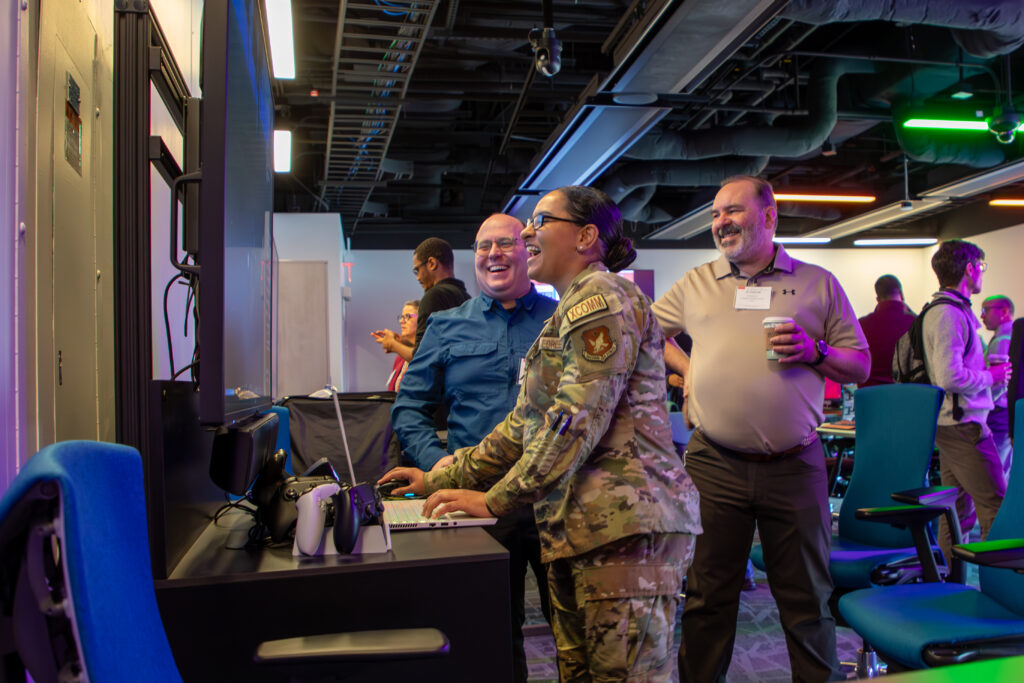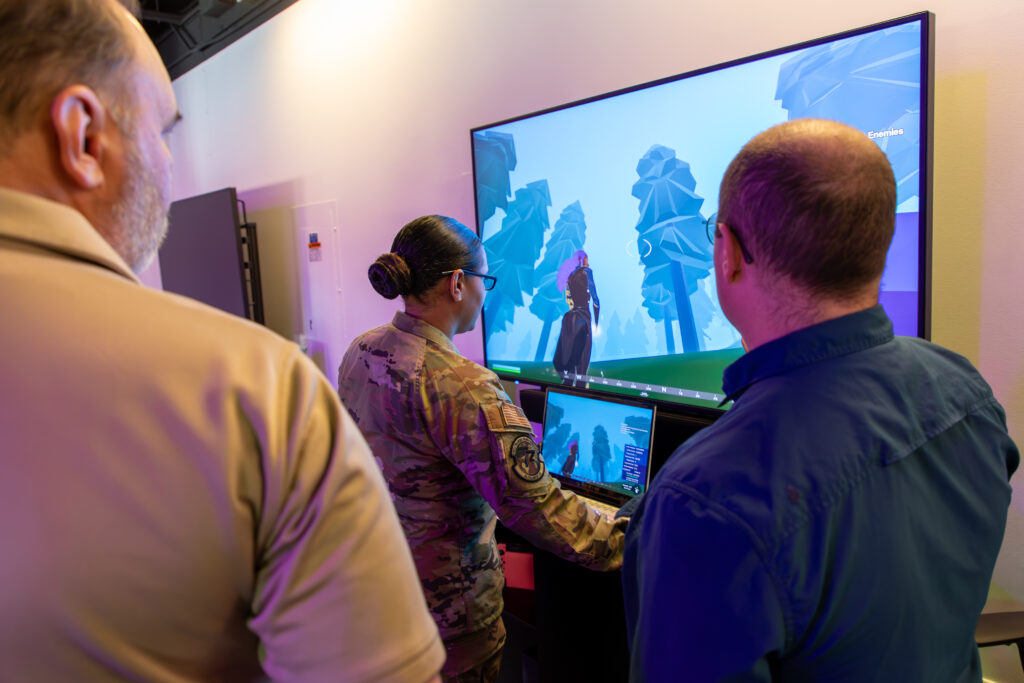GameaPalooza US AirForce Event at NC State Draws a Crowd!
Gaming in military education has traditionally been reserved for wargaming and simulation, however, a recent event hosted by NC State, entitled “Gameapalooza” spotlighted emerging applications of gaming technology, specifically for the US Air Force. Designers showcased novel games optimized for learning ranging from Air Force Dr. (Lt. Col.) Dan Finkenstadt, who showcased integrating acquisitions and resource management, to Dr. Robert Handfield of N.C. State, whose eye-opening discussion on the vital role of supply chain management highlighted by the challenges of the COVID pandemic. Each session not only emphasized the need for cutting-edge training solutions but also showcased the boundless possibilities that gamification offers to learners in nearly limitless fields of study.
The session was sponsored by Dr. Wendy Walsh, Chief Learning Officer for the Air Education Training Command. Dr. Walsh was a great supporter of the importance of gaining real-life experiences that can improve decision-making and competencies for warfighters.
The landmark event was attended by game developers, scholars, AFGaming.com staff, Air National Guard, Air Force Reserves, and military strategists. This event wasn’t just a showcase of gamified education and training’s potential; it was a clarion call for refined training pathways to military readiness in the Department of Defense (DoD). Participants were challenged to explore focused questions tied to improving the Department of the Air Force’s integration of gaming across force development efforts, optimizing alignment and recognition of competency attainment achieved through gaming, and enhancing collaboration within the DAFs gaming network to build needed warfighting capabilities.

Dr. Arnav Jhala of N.C. State illustrated how deliberately applying gaming frameworks into military training could vastly enhance learner engagement in achieving learning outcomes across critical competencies. Furthermore, Dr. Jhala’s work in leveraging artificial intelligence (AI) to assist in automating the creation of learning content and game elements illuminated the untapped potential for educational games to be rapidly developed and deployed to meet emerging training needs.

The Digitized Leadership Reaction Course, introduced by Matt Corriea from Air Force ROTC, was developed using Minecraft and exemplified the value of experiential learning. His study validated off-the-shelf video games can provide a low-cost boost to the development of foundational competencies and also dramatically improve knowledge retention rates. Corriea’s insights suggested a paradigm shift in military training methodologies targeted at intellectual and teamwork dominance as asymmetric advantages core to growing competencies critical to warfighting.
Master Sgt. Jesse High, a linguist assigned to the 316th Training Squadron at Goodfellow Air Force Base discussed his exploration of multiplayer online role-playing games in language learning and how they underscored the practical benefits of gamification. He explained how his students gained enhanced language proficiency by playing World of Warcraft in Korean. The flexibility and effectiveness of game-based experiences inspired MSgt High to create ‘Mage Duel,’ to support the Air Force’s language learning. Several of the participants got to experiment with a live demo of the game, which has proven to be exceptional in terms of its success in teaching warfighters new languages as diverse as Swahili, Arabic, and others.
Strategic discussions led by Col. Dave Blair from the Strategic Studies Group revealed critical insights of wargaming as a collective learning endeavor for mission success. Additionally, Lt. Col. Michael Joanos of Air University’s LeMay Center painted a picture of the strategic advantages of cultivating wargaming experience through Airman-developed board games. The potential to simulate complex scenarios in a risk-free environment offers unparalleled opportunities for strategic and tactical development.
Additionally, the focus on AI and virtual reality infrastructure as discussed by Walt DeGrange pointed towards an exciting future where digital realms become central to military training. The vision of AI as a dynamic facilitator in training scenarios underscores a future of personalized and adaptive learning experiences tailored to an Airman’s interactions and potential. This resonated with several participants, including Dr. Andy Clayton of Air University, whose work includes applying AI to generating immersive training scenarios.
‘Gameapalooza’ marked a pivotal moment in the cultural shift towards embracing gamification in military training. Overcoming institutional resistance, technological hurdles, and cultural skepticism are critical steps forward in this evolution. The event heralded a new era of innovation in training methodologies, emphasizing the importance of adaptability, collaboration and forward-thinking in the face of dynamic military challenges. The event was held in the Hunt Library’s Visual Lab, which allowed participants to explore the benefits of being in a top technology university. The current demo of the E-Sports Center was not yet ready for prime time, but will be ready for the next Gameapalooza!
This blog was developed based on an approved post by the Air Education and Training Command.


